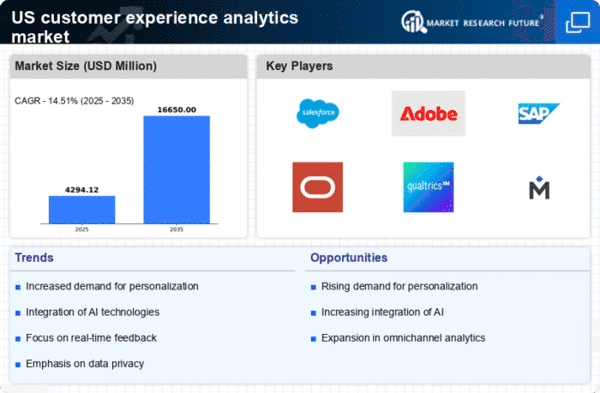Advancements in Technology and Tools
Technological advancements are significantly impacting the customer experience-analytics market, as new tools and platforms emerge to facilitate better data collection and analysis. Innovations in cloud computing, big data, and artificial intelligence are enabling organizations to process vast amounts of customer data more efficiently. These advancements allow for more sophisticated analytics capabilities, such as predictive modeling and sentiment analysis, which can lead to improved customer experiences. As businesses increasingly adopt these technologies, the customer experience-analytics market is expected to grow, with estimates suggesting a compound annual growth rate (CAGR) of around 20% over the next few years.
Growing Demand for Data-Driven Insights
The customer experience-analytics market is witnessing a growing demand for data-driven insights as organizations increasingly recognize the value of leveraging data to enhance customer interactions. Companies are investing in analytics tools to gather and analyze customer feedback, behavior, and preferences. This trend is reflected in the projected growth of the market, which is expected to reach approximately $10 billion by 2026. Businesses are utilizing these insights to make informed decisions, optimize customer journeys, and improve overall satisfaction. The ability to derive actionable insights from data is becoming a critical differentiator in a competitive landscape, driving the adoption of advanced analytics solutions within the customer experience-analytics market.
Rising Importance of Omnichannel Strategies
The customer experience-analytics market is experiencing a rising importance of omnichannel strategies, as businesses seek to provide seamless experiences across multiple touchpoints. Customers today interact with brands through various channels, including social media, websites, and in-store visits. Analytics tools that can integrate data from these diverse sources are becoming essential for understanding customer behavior and preferences. Companies that successfully implement omnichannel strategies are likely to see improved customer satisfaction and loyalty. This trend is driving the demand for comprehensive analytics solutions that can provide a holistic view of the customer journey within the customer experience-analytics market.
Regulatory Compliance and Data Privacy Concerns
Regulatory compliance and data privacy concerns are increasingly influencing the customer experience-analytics market, as organizations must navigate complex legal frameworks governing customer data usage. With regulations such as the California Consumer Privacy Act (CCPA) and others, businesses are compelled to adopt analytics solutions that prioritize data security and compliance. This shift not only protects customer information but also builds trust and enhances brand reputation. As companies invest in compliant analytics tools, the customer experience-analytics market is likely to see a surge in demand for solutions that address these regulatory challenges while still delivering valuable insights.
Increased Focus on Customer Retention Strategies
In the customer experience-analytics market, there is an increased focus on customer retention strategies as businesses strive to maintain their existing customer base. Retaining customers is often more cost-effective than acquiring new ones, prompting organizations to invest in analytics tools that help identify at-risk customers and understand their needs. According to recent studies, improving customer retention rates by just 5% can lead to an increase in profits of 25% to 95%. This financial incentive drives companies to adopt customer experience analytics solutions that provide insights into customer behavior, preferences, and satisfaction levels, ultimately enhancing retention efforts.
















